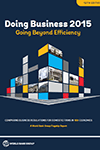Overview
Doing Business 2015: Going Beyond Efficiency, a World Bank Group flagship publication, is the 12th in a series of annual reports measuring the regulations that enhance business activity and those that constrain it. Doing Business presents quantitative indicators on business regulations and the protection of property rights that can be compared across 189 economies—from Afghanistan to Zimbabwe—and over time.
Doing Business measures regulations affecting 11 areas of the life of a business. Ten of these areas are included in this year’s ranking on the ease of doing business: starting a business, dealing with construction permits, getting electricity, registering property, getting credit, protecting minority investors, paying taxes, trading across borders, enforcing contracts and resolving insolvency. Doing Business also measures labor market regulation, which is not included in this year’s ranking.
Data in Doing Business 2015 are current as of June 1, 2014. The indicators are used to analyze economic outcomes and identify what reforms of business regulation have worked, where and why. This year’s report introduces a notable expansion of several indicator sets and a change in the calculation of rankings.
Main findings
- Doing Business 2015: Going Beyond Efficiency finds that entrepreneurs in 123 economies saw improvements in their local regulatory framework last year. Between June 2013 and June 2014, the report, which measures 189 economies worldwide, documented 230 business reforms, with 145 reforms aimed at reducing the complexity and cost of complying with business regulation, and 85 reforms aimed at strengthening legal institutions - with Sub-Saharan Africa accounting for the largest number of such reforms. Read about business reforms.
- Tajikistan, Benin, Togo, Côte d’Ivoire, Senegal, Trinidad and Tobago, the Democratic Republic of Congo, Azerbaijan, Ireland and the United Arab Emirates are among the economies that improved the most in 2013/2014 in areas tracked by Doing Business. Together, these 10 top improvers implemented 40 regulatory reforms making it easier to do business.
- Sub-Saharan Africa accounts for 5 of the 10 top improvers in 2013/14. The region also accounts for the largest number of regulatory reforms making it easier to do business in the past year—75 of the 230 worldwide. More than 70% of its economies carried out at least one such reform.
- For the first time this year, Doing Business collected data for 2 cities in 11 economies with more than 100 million inhabitants. The economies are: Bangladesh, Brazil, China, India, Indonesia, Japan, Mexico, Nigeria, Pakistan, the Russian Federation, and the United States. The added city enables a subnational comparison and benchmarking against other large cities. Differences between cities are more common in indicators measuring the steps, time and cost to complete a standardized transaction where local agencies play a larger role, finds the report.
- Case studies highlighting good practices in 8 of the areas measured by Doing Business indicator sets are featured in the report: the growing efficiency of company registries in starting a business; zoning and urban planning in dealing with construction permits; measuring quality of land administration in registering property; importance of registries in getting credit; going beyond related-party transactions in protecting minority investors; trends before and after the financial crisis in paying taxes; judicial efficiency supporting freedom of contract in enforcing contracts; and measuring strength of insolvency laws in resolving insolvency. See all case studies.
- The report this year expands the data in three of the 10 topics covered, with further plans to expand on five topics in next year’s report. The Doing Business rankings are now based on a distance to the frontier measure. Each economy from the 189 economies measured is evaluated based on how close their business regulations are to the best global practices. A higher score indicates a more efficient business environment and stronger legal institutions.

